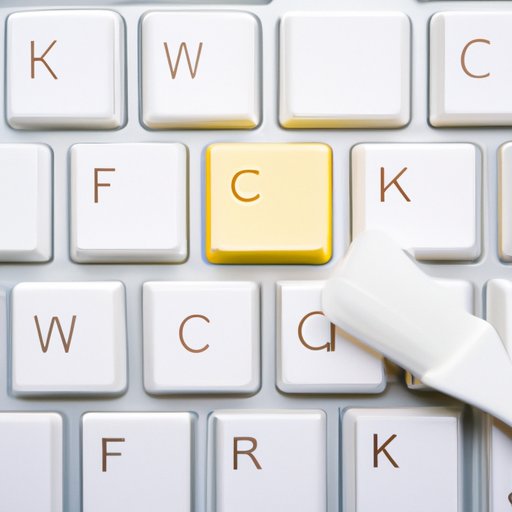Introduction
When was the last time you gave your keyboard a good cleaning? Keyboards are one of the dirtiest places in your home or office due to the accumulation of dust, debris, and human oils and sweat. Regular cleaning and maintenance of your keyboard can help prevent the spread of germs and bacteria, prolong the lifespan of your keyboard and improve its performance. In this article, we provide you with a comprehensive guide on how to clean and maintain your keyboard to ensure optimal performance and hygiene.
Step-by-Step Guide to Cleaning a Keyboard
Before we start cleaning the keyboard, we need to gather the necessary tools. You will need a microfiber cloth, a can of compressed air, a small screwdriver, rubbing alcohol, cotton swabs, and soap and water.
1. Turn off the computer and disconnect the keyboard from the computer.
2. Shake or blow out any loose debris from the keyboard.
3. Remove the keys and clean them thoroughly. Use a small screwdriver to gently pry up the keys, or use a keycap puller if you have one. Once they are removed, wash or wipe them down with soap and water. Be sure to clean the underside of the key as well.
4. Use a can of compressed air to remove debris and dust from the keyboard. Aim the nozzle between the keys and blow out any dust or debris.
5. Dampen the microfiber cloth with rubbing alcohol and clean the surface of the keyboard. Use a cotton swab to clean in between the keys.
6. Once everything is clean and dry, reassemble the keyboard and reconnect it to your computer or laptop.
Common Keyboard Cleaning Mistakes and How to Avoid Them
When cleaning your keyboard, it’s important to avoid common cleaning mistakes that can damage your keyboard or computer components.
1. Avoid using too much liquid when cleaning your keyboard, as this can damage the keys and internal components. Always use a damp, not wet, microfiber cloth with rubbing alcohol to clean the surface of the keyboard.
2. Never use harsh chemicals or cleaners to clean your keyboard. These can erode the protective coating on the surface of the keys and damage internal components.
3. Don’t use a vacuum cleaner or hairdryer to remove debris and dust from your keyboard. This can suck up keys or internal components and cause damage.
4. Don’t forget to turn off and disconnect your keyboard before cleaning it. Failure to do so can cause damage to both your keyboard and your computer.
The Importance of Keyboard Maintenance
Keyboard maintenance is crucial not only for keyboard longevity but also for your computer’s performance. Dust, dirt, hair, and grime can build up in the crevices of your keyboard, which can lead to poor performance, malfunctioning keys, and even the spread of germs and bacteria.
A dirty keyboard can also cause performance issues with your computer, leading to crashes, slow response times, and reduced efficiency. Additionally, a frequently cleaned keyboard can help prolong your computer’s lifespan by preventing dust buildup inside the keys.
To avoid costly repairs and replacements, it’s essential to maintain and regularly clean your keyboard.
Expert Advice on Keyboard Maintenance
We spoke to several keyboard experts to get their advice on keeping your keyboard clean and well-maintained.
“I always recommend using compressed air to remove debris and dust from the keyboard first,” says Mary, a keyboard designer. “Then lightly clean the surface of the keyboard with rubbing alcohol and a microfiber cloth. Be sure to use a cotton swab to clean in between the keys.”
According to Michael, a computer repair expert, “It’s essential to avoid using harsh chemicals or cleaners that can damage the protective coating on the keys. Invest in a good-quality keyboard cover to prevent dust and dirt from getting in between the keys.”
Kim, a tech blogger, suggests “Regular preventative cleaning and maintenance is crucial. Set a reminder on your calendar to clean your keyboard every month, and don’t forget to frequently wash your hands to prevent the spread of germs and bacteria.”
Product Recommendations
When it comes to cleaning a keyboard, some tools and solutions work better than others. Here are some of our recommendations:
1. Microfiber cloths: These are perfect for cleaning the surface of your keyboard. They are also machine washable and eco-friendly.
2. Compressed air cans: These are great for removing dust and debris from your keyboard’s crevices.
3. Keycap pullers: If you have trouble removing keys with a screwdriver, a keycap puller can be a less invasive alternative.
4. Rubbing alcohol: Rubbing alcohol is essential for cleaning your keyboard’s surface, as it disinfects and removes any grime or oils.
5. Keyboard covers: Prevent dust and dirt from getting between your keys with a good keyboard cover. They come in various sizes and materials to suit your needs.
Some of the best cleaning solutions in the market include Cyber Clean, Austin’s Air Healthmate HEPA Filter, iKlear, and WetKeys Washable Keyboard.
Conclusion
Maintaining a clean and hygienic keyboard is essential for both your keyboard’s longevity and your computer’s performance. Cleaning your keyboard is easier than you might think, and you can use readily available tools and solutions. Remember to avoid common cleaning mistakes and invest in the right tools and products for the job. With a little effort, you can keep your keyboard in top condition and prevent the spread of germs and bacteria.
